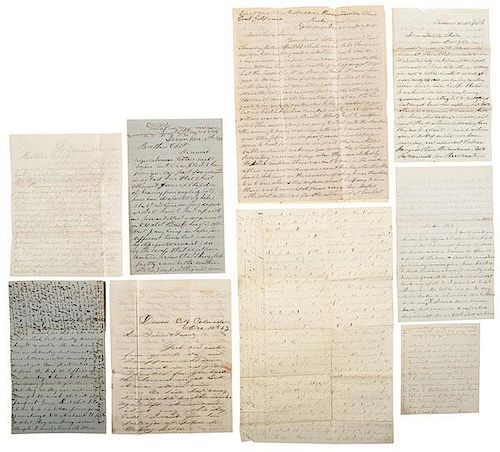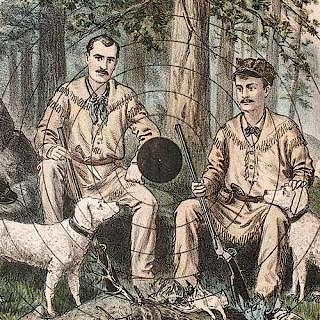Extensive Archive Associated with Chester W. Burton and Family, Upstate New York, Incl. Letters Written from Denver Concerning Possible Rebel Invasion
About Seller
6270 Este Ave.
Cincinnati , OH 45232
United States
With offices in Cincinnati, Cleveland and Denver, Cowan’s holds over 40 auctions each year, with annual sales exceeding $16M. We reach buyers around the globe, and take pride in our reputation for integrity, customer service and great results. A full-service house, Cowan’s Auctions specializes in Am...Read more
Two ways to bid:
- Leave a max absentee bid and the platform will bid on your behalf up to your maximum bid during the live auction.
- Bid live during the auction and your bids will be submitted real-time to the auctioneer.
Bid Increments
| Price | Bid Increment |
|---|---|
| $0 | $25 |
| $500 | $50 |
| $1,000 | $100 |
| $2,000 | $250 |
| $5,000 | $500 |
| $10,000 | $1,000 |
| $20,000 | $2,500 |
| $50,000 | $5,000 |
| $100,000 | $10,000 |
About Auction
Nov 20, 2015 - Nov 21, 2015
Cowan's Auctions dawnie@cowans.com
- Lot Description
Extensive Archive Associated with Chester W. Burton and Family, Upstate New York, Incl. Letters Written from Denver Concerning Possible Rebel Invasion and Post-War Letters from Montana
Lot of 750+ items, including correspondence between Chester W. Burton and family and friends throughout the country, financial documents concerning money transactions and deeds, pamphlets, account books, diaries, family photographs, and newspaper clippings. Ca mid-19th century through early 20th century.
Chester Warren Burton (1831-1916) was born in Portland, NY, to War of 1812 Veteran, Hiram Burton and his wife Harriet. Burton’s grandfather and uncles also fought in the War of 1812, with one uncle, Salmon Burton, losing his life as a result of wounds received at the Battle of Little York, Canada, 1813. Burton married fellow-Portland resident, M. Freedom Harris (1838-1916) in 1861, and together they had three children. Freedom was heavily involved in the Universalist Social Society, which provided aid to local soldiers. Although Burton was drafted during the Civil War on August 18, 1863, he provided a substitute named James Kelly who deserted after one month of service. An 1881 Portland/Chautauqua NY Atlas includes a brief biography of Burton, identified as a “fruit grower” who also worked as a civil engineer for six years and served as an assessor. He was also described as a “Universalist and a republican.”
Approx. 75 pre-Civil War letters, documents, land indentures, etc., are included in the archive, which focus primarily on Burton’s grandfather, Simon, and his father, Hiram, as well as Freedom’s father, Joseph Elliot Harris. Some of the correspondence pertains to the family’s pursuit of bounty claims owed Simon in Indiana. Hiram Burton’s handwritten application for a pension in which he outlines his service as a War of 1812 Veteran, which he submitted in 1871, also accompanies the archive.
Another noteworthy, pre-war item is a penciled note calling for a public demonstration against the introduction of slavery into the territories, dated March 1861.
The collection contains close to 100 Letters, documents, and other ephemera dating from the 1860s, including Civil War-era correspondence, such as a small batch of letters written to Burton from soldiers from Co. D of the 9th New York Cavalry: James Ogden who enlisted as a corp. and was promoted to a bugler (which he noted in a Dec. 1861 letter); and Charles Crosby, who enlisted as a corp. and was later promoted to a sergeant.
Burton also corresponded with "Joe E. Cook" of Western Pennsylvania, who wrote in a Jan. 20, 1861 letter:
Surely I “Hurrah for Anderson”, and groan for our treason-fostering President. It is folly to predict on the events that are transpiring, and which are in immediate connection and dependence with so vacillating and treacherous old BENEDICT Batch. But, let the events take whatever turn they may, at the beginning; ever so horrid and bloody, the result will be glorious. I cannot believe but that we are about to witness the worst stage on which this nation has ever acted, and do tremble when I think of the guillotine of vengeance that the southern people are raising higher and higher above their own heads, trampling with haughty tread and iron heel over the mute-floored powdermills that for years have been accumulating with black fulminating dust of hate.
Another letter written early in the war to Friend Chet from Cook includes strong content about joining the war effort, the Constitution, and the issue of Slavery. In the October 14, 1861 letter, Cook states, in part:
With Gerrit Smith I abhor war, but with him I am “sick of the shams of this war” and am quite unable to decide what will be the eventuation of the Administration in regard to Slavery. If it shall decide to emancipate unreservedly then the war will be protracted and very bloody, but if they shall continue as the watch-word, “Vive la Constitution,” then the war will be short… He goes on to mention John Brown Jr. taking a number of men from Erie County, where he resided, as well as Crawford County, PA.
A small group of war-date documents pertain to Burton being drafted, including a partially printed draft notice from the provost marshal’s office, with a RR pass to the muster location in Dunkirk, NY and two small printed notices, one a circular on types of exemptions, the other outlining the procedure for supplying a substitute or paying $300 to Internal Revenue. The circular emphasized that the drafted individual must appear in person with receipt or send substitute, or be charged with desertion. Burton’s draft deferment is also included.
Some of the most interesting Civil War-period letters in this archive were written from Denver, CO, by Burton’s sister, Maria, and her husband, J. Billings. They concern the sizable population of Southerners in the Colorado gold fields and in Denver itself, and the agitation among them to claim the territory for the Confederacy. In a letter dated Sept. 5, 1861, believed to be from Maria, panic in Denver over a possible rebel invasion/insurrection is discussed:
We are having exciting times here & have had for the last 4 weeks. There are a great many secessionist here & they talk pretty tough, but as yet have done nothing but talk. There is a regiment raising here for home protection & it does not suit the southern Chivalry here. They make all sorts threats & there are all sorts of rumors fresh ones every day. First comes about the Texas Rangers then the Indians then the secessionists from the mountains & I suppose the next thing will be something else. The first United States court met last Monday & the Grand Jury has been doing something I should think by the way the Rebels are leaving town this afternoon & I hope that it will have the effect to keep them away. One of them is our nearest neighbor & the big gun among them. I think the grand jury must have a traitor among them. I hope that he may get his just desserts…
There is a great deal of anxiety to hear from the states here to know what is going on there. Times are very dull here and have been all summer. Money is out of the question… it is dicker, barter & trade.
There are a great many men in the mountains that are taking out money very fast & then again there are a great many that are making nothing. I have some property here that is very valuable if there was money here to pay for it.
In a follow-up letter, dated Oct. 20, 1861, Maria mentions the increased level of security in Denver...Home Guard has 150 men stationed throughout town every night. Men serve duty every four days.
Burton's brother-in-law, Billings, provides an interesting description of early Denver, and he mentions the following incident, while speaking of the local sheriff...I have not been able to see him yet as he went South about the the time you left. He will be back tomorrow, then I suppose he will take Van Horn up to Central and hang him (Dec. 14, 1863).
Billings was likely referring to William S. Van Horn, who was convicted of murdering a gentleman by the name of Josiah Copeland with the help of his mistress, although she was not charged with the crime. Van Horn was taken to Denver and held in the Arapahoe County Jail in an attempt to avoid a lynching, and on December 18, 1863, he was hanged in front of a crowd of thousands in Central City. This was the first legal execution carried out under territorial authority.
Two letters written to Burton from an unidentified homesteader in Montana, between February and the First day of Spring, 1867, feature rich content about the Gold Rush and surviving the winter out west. In the February 27th letter, he offers a detailed description of the machine used in hard-rock gold mining to pulverize the quartz to remove the gold, which is then "amalgamated" with mercury to extract the gold. In the second letter, he describes in great detail stampeding during the harsh Montana winters. He states:
You must not call the Stampeder foolish. He came here to make a big thing, has worked all summer for wages which though good will never approach riches...A stampede occurs. The weather is mild; he has enough money to buy an outfit, and with those prospects before him...Home by another winter. Is he to blame for not seeing the terrors of a winter's stampede in the rocky mountains! I studied my plans carefully, and know that they will operate, among which I was to let out the stampeding, but my notion is to move and the fact that I was unable to purchase an outfit has left me still thirsting for gold...
The archive also includes hundreds of post-war documents, manuscripts and related ephemera, such as letters from children and grandchildren to Burton and his wife in Chautauqua, NY, and while wintering in Florida; many church pamphlets; and Women’s Christian Temperance Union pamphlets. - Shipping Info
-
SHIPPING. At the request of the buyer, Cowan's will authorize the shipment of purchased items. Shipments usually occur within two weeks after payment has been received. Shipment is generally made via UPS Ground service. Unless buyer gives special instructions, the shipping method shall be at the sole discretion of Cowan's Auctions, Inc.. Cowan's is in no way responsible for the acts or omissions of independent handlers, packers or shippers of purchased items or for any loss, damage or delay from the packing or shipping of any property.
-
- Buyer's Premium



 EUR
EUR CAD
CAD AUD
AUD GBP
GBP MXN
MXN HKD
HKD CNY
CNY MYR
MYR SEK
SEK SGD
SGD CHF
CHF THB
THB















